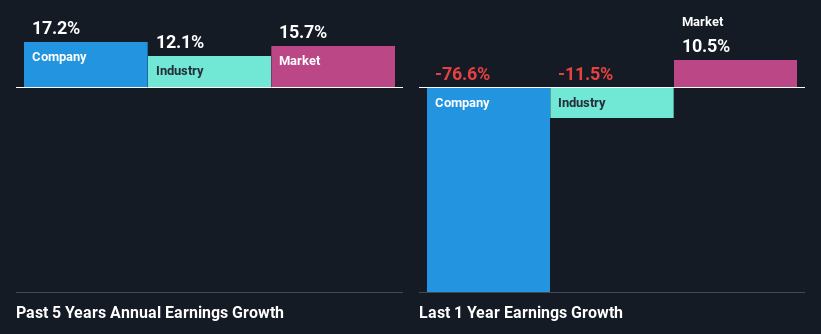- Austria
- /
- Basic Materials
- /
- WBAG:WIE
Wienerberger AG's (VIE:WIE) Stock Has Shown Weakness Lately But Financial Prospects Look Decent: Is The Market Wrong?

With its stock down 17% over the past three months, it is easy to disregard Wienerberger (VIE:WIE). But if you pay close attention, you might find that its key financial indicators look quite decent, which could mean that the stock could potentially rise in the long-term given how markets usually reward more resilient long-term fundamentals. Particularly, we will be paying attention to Wienerberger's ROE today.
ROE or return on equity is a useful tool to assess how effectively a company can generate returns on the investment it received from its shareholders. In other words, it is a profitability ratio which measures the rate of return on the capital provided by the company's shareholders.
Check out our latest analysis for Wienerberger
How Do You Calculate Return On Equity?
Return on equity can be calculated by using the formula:
Return on Equity = Net Profit (from continuing operations) ÷ Shareholders' Equity
So, based on the above formula, the ROE for Wienerberger is:
4.0% = €112m ÷ €2.8b (Based on the trailing twelve months to June 2024).
The 'return' refers to a company's earnings over the last year. So, this means that for every €1 of its shareholder's investments, the company generates a profit of €0.04.
Why Is ROE Important For Earnings Growth?
So far, we've learned that ROE is a measure of a company's profitability. Depending on how much of these profits the company reinvests or "retains", and how effectively it does so, we are then able to assess a company’s earnings growth potential. Assuming everything else remains unchanged, the higher the ROE and profit retention, the higher the growth rate of a company compared to companies that don't necessarily bear these characteristics.
Wienerberger's Earnings Growth And 4.0% ROE
At first glance, Wienerberger's ROE doesn't look very promising. A quick further study shows that the company's ROE doesn't compare favorably to the industry average of 9.1% either. However, the moderate 17% net income growth seen by Wienerberger over the past five years is definitely a positive. We reckon that there could be other factors at play here. For instance, the company has a low payout ratio or is being managed efficiently.
We then compared Wienerberger's net income growth with the industry and we're pleased to see that the company's growth figure is higher when compared with the industry which has a growth rate of 12% in the same 5-year period.

Earnings growth is a huge factor in stock valuation. What investors need to determine next is if the expected earnings growth, or the lack of it, is already built into the share price. Doing so will help them establish if the stock's future looks promising or ominous. If you're wondering about Wienerberger's's valuation, check out this gauge of its price-to-earnings ratio, as compared to its industry.
Is Wienerberger Making Efficient Use Of Its Profits?
Wienerberger has a low three-year median payout ratio of 24%, meaning that the company retains the remaining 76% of its profits. This suggests that the management is reinvesting most of the profits to grow the business.
Besides, Wienerberger has been paying dividends for at least ten years or more. This shows that the company is committed to sharing profits with its shareholders. Upon studying the latest analysts' consensus data, we found that the company is expected to keep paying out approximately 28% of its profits over the next three years. Regardless, the future ROE for Wienerberger is predicted to rise to 13% despite there being not much change expected in its payout ratio.
Summary
Overall, we feel that Wienerberger certainly does have some positive factors to consider. Despite its low rate of return, the fact that the company reinvests a very high portion of its profits into its business, no doubt contributed to its high earnings growth. Having said that, looking at the current analyst estimates, we found that the company's earnings are expected to gain momentum. To know more about the company's future earnings growth forecasts take a look at this free report on analyst forecasts for the company to find out more.
Valuation is complex, but we're here to simplify it.
Discover if Wienerberger might be undervalued or overvalued with our detailed analysis, featuring fair value estimates, potential risks, dividends, insider trades, and its financial condition.
Access Free AnalysisHave feedback on this article? Concerned about the content? Get in touch with us directly. Alternatively, email editorial-team (at) simplywallst.com.
This article by Simply Wall St is general in nature. We provide commentary based on historical data and analyst forecasts only using an unbiased methodology and our articles are not intended to be financial advice. It does not constitute a recommendation to buy or sell any stock, and does not take account of your objectives, or your financial situation. We aim to bring you long-term focused analysis driven by fundamental data. Note that our analysis may not factor in the latest price-sensitive company announcements or qualitative material. Simply Wall St has no position in any stocks mentioned.
About WBAG:WIE
Wienerberger
Produces and sells clay blocks, facing bricks, roof tiles, and pavers in Europe West, Europe East, and North America.
Good value with reasonable growth potential and pays a dividend.
Similar Companies
Market Insights
Community Narratives



